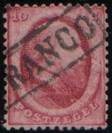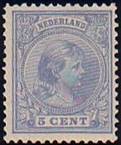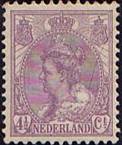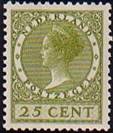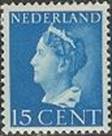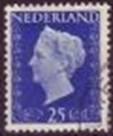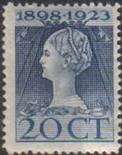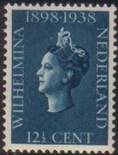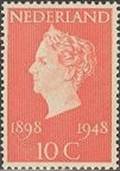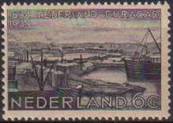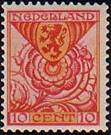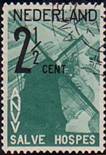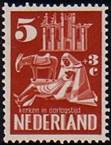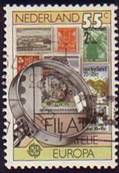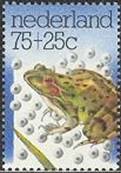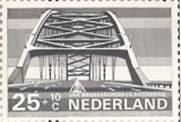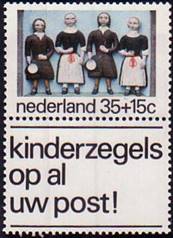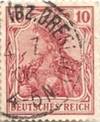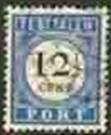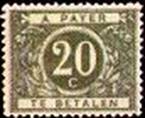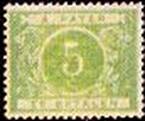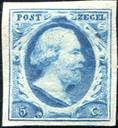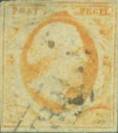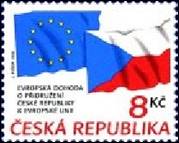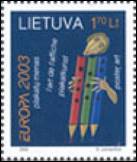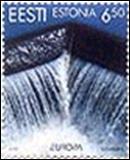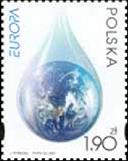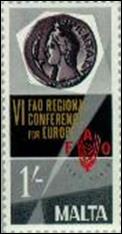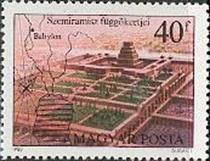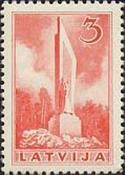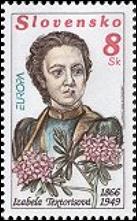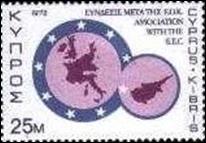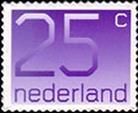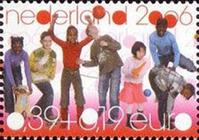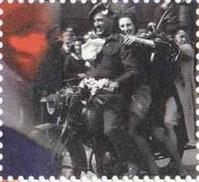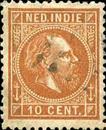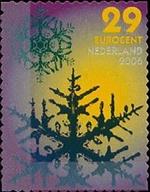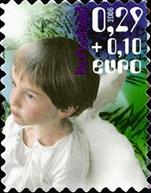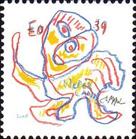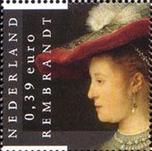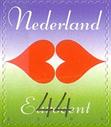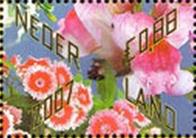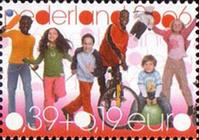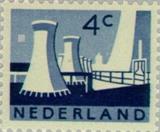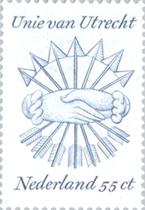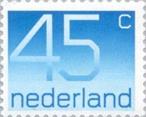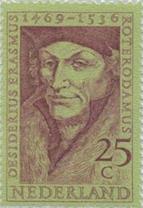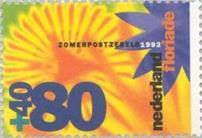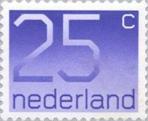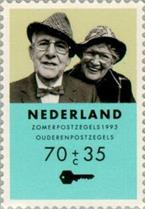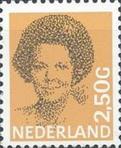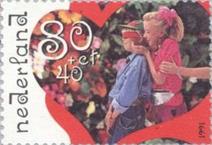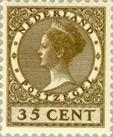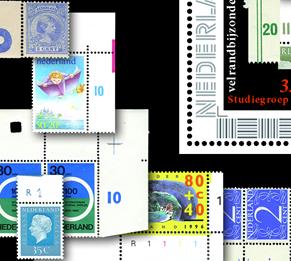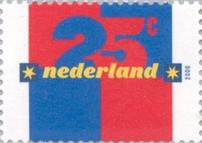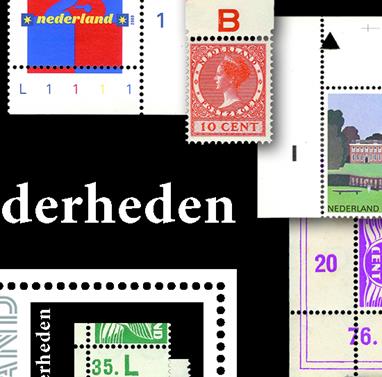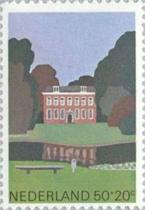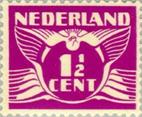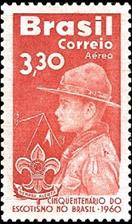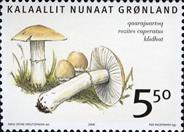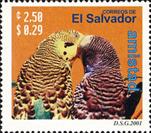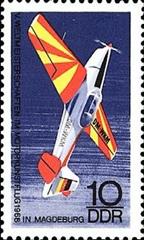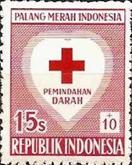Netherlands stamps
P=have O=don’t have it
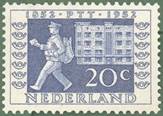
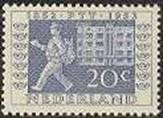
Scott: #335P,
#339P
Issued: 28.6.1952
Centenary, Dutch Postage Stamps
International Postage Stamp Centenary
Exhibition
Inside #335, #339: Stamp on Envelope

Scott: #448-50P
Issued: 8.5.1967
AMPHILEX '67
|
|
|
|
|
Inside #448: |
Inside #449: |
Inside #450: |
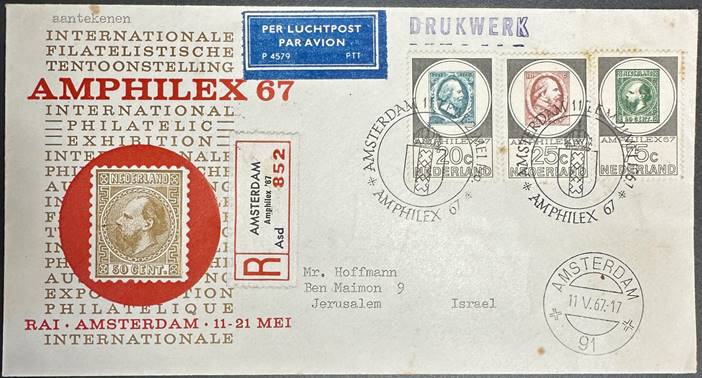
FDCP
See also - Special Album
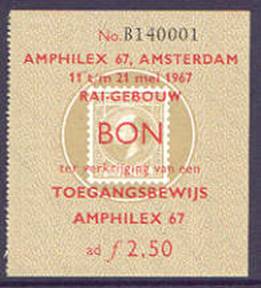
AMPHILEX '67P
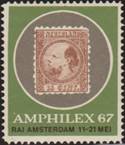
AMPHILEX '67
Non-postal stamp issued by the
Thanks to Lloyd Gilbert
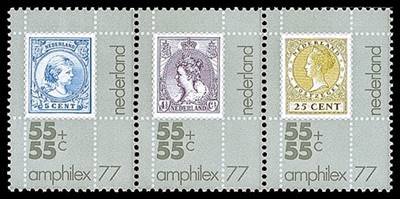
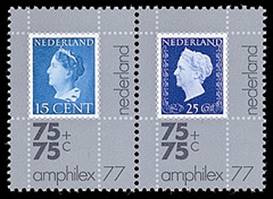
Scott: #B522-6P
Issued: 8.10.1976
AMPHILEX '77
|
|
|
|
|
|
Inside #B522: |
Inside #B523: |
Inside #B524: |
|
|
|
|
||
|
Inside #B525: |
Inside #B526: |
||
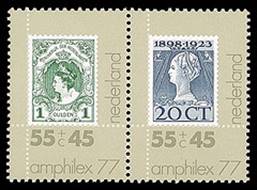
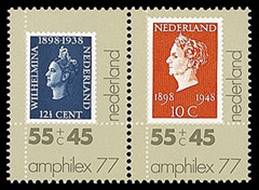
Scott: #B535-8P
(#B536aP,
#B538bP)
Issued: 26.5.1977
AMPHILEX '77
|
|
|
|
Inside #B535: |
Inside #B536: |
|
|
|
|
Inside #B537: |
Inside #B538: |
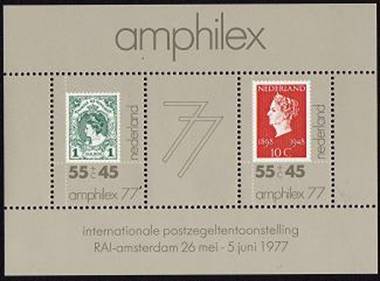
Scott: #B538aP
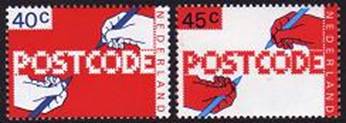
Scott: #574-5P
Issued: 14.3.1978
Introduction of New Postal Code
Inside #574-5: Pseudo Stamps
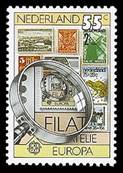
Scott: #587P
Issued: 2.5.1979
CEPT - Europa 1979
Inside #587:
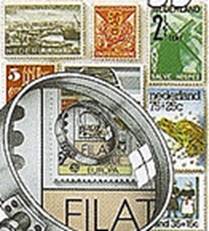
|
|
|
|
|
|
|
|
|
|
|
|
|
|
|
|
|
(Thanks to Komlóssy Zoltán
for the scan) |
|
|
|
|
|
Netherlands #B513P |
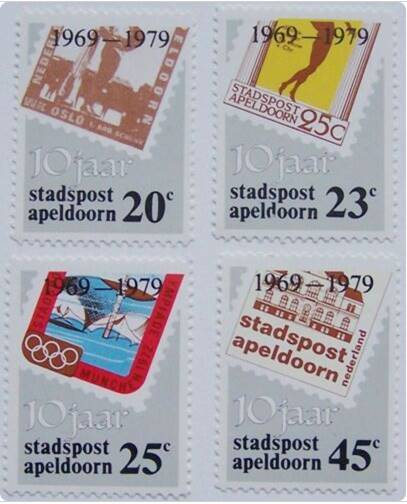
XXXP
Issued: 1979
10 years of Apeldoorn City Stamps
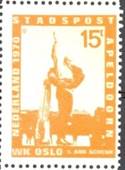
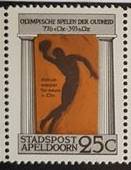
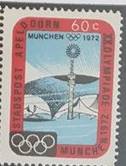

Inside #XXX: City Stamps
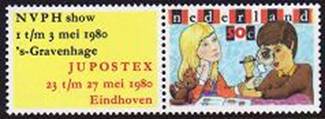
Scott: #600P
Issued: 1.5.1980
NVPH Stamp Show
Inside #600: Stamp Collecting
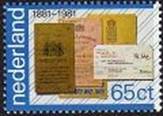
Scott: #611P
Issued: 19.5.1981
Centenary, National Savings Bank
Inside #611: Savings Stamp
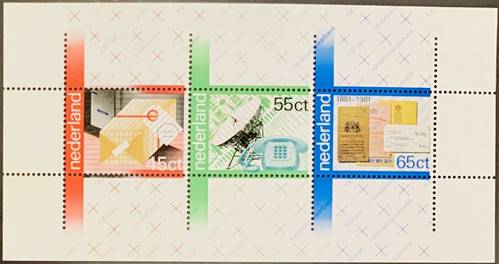
Scott: #611aP

Scott: #B604-6P
Issued: 13.6.1984
FILACENTO '84
Inside #B604: Pseudo Stamp
Inside #B606: Stamp Collecting
Inside #B605:
|
|
|
|
|
|
|
Egypt #J17P |
|
|
|
|
|
||
|
|
|
||
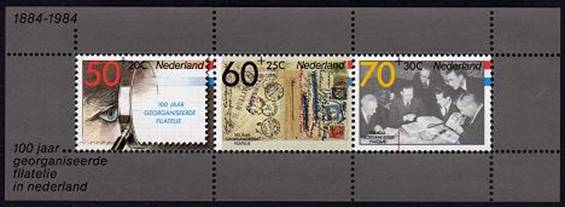
Scott: #B606aP
Issued: 5.9.1984
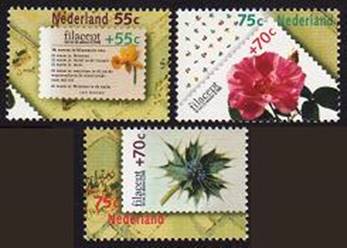
Scott: #B635-7P
Issued: 23.2.1988
FILACEPT '88
Inside #B635-7: Pseudo Stamps
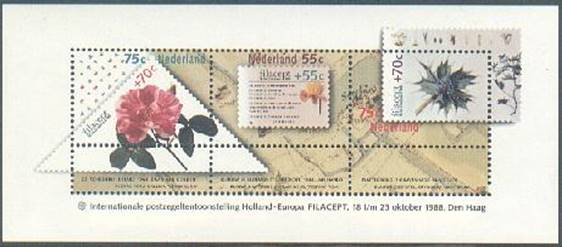
Scott: #B637aP
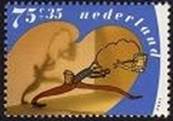
Scott: #B655P
Issued: 7.11.1990
Surtax for Child Welfare
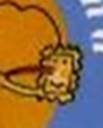
Inside #B655: Pseudo Stamps
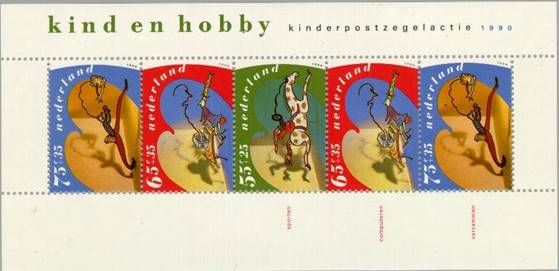
Scott: #B655aP
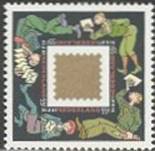
Scott: #803P
Issued: 28.11.1991
Christmas
Inside #803: Pseudo Stamps
+
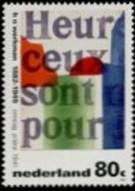
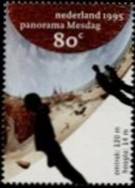
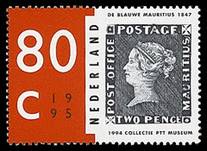
Scott: #874P,
#875P,
#876P
Issued: 17.1.1995
Acquisition of
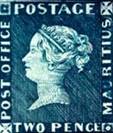 Inside #876: Mauritius #2O
Inside #876: Mauritius #2O
http://www.muscom.nl/collecties/index.htm
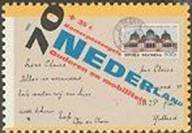
Scott: #B686P
Issued: 11.4.1995
Senior Citizens
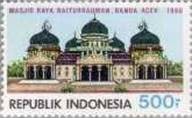 Inside
#B686:
Inside
#B686:
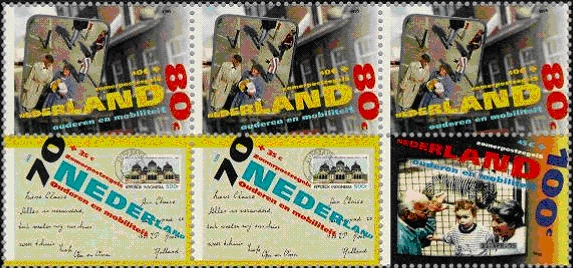
Scott: #B688aP
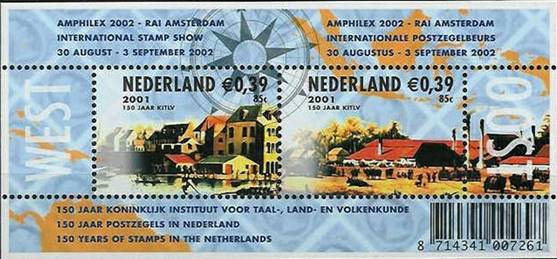
Scott: #1084 a-bP
Issued: 12.10.2001
150th
Publicity, AMPHILEX 2002 Exhibition
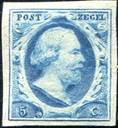 Inside #1084 a-b (On stamps and in margin
background of sheet): Netherlands #1P
Inside #1084 a-b (On stamps and in margin
background of sheet): Netherlands #1P
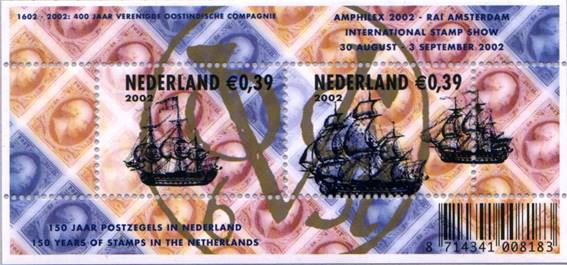
Scott: #1136P
Issued: 30.08.2002
150th
Publicity, AMPHILEX 2002 Exhibition
Inside #1136 (On stamps and in margin
background of sheet):
|
|
|
|
|
|
|
|
![[Land, Air and Water, type ]](Netherlands_image134.jpg)
Scott: #1152aP
Issued: 24.06.2003
Land, Air and Water
Inside #1151, #1152: Pseudo Stamps
![[The 75th Anniversary of Dutch Stamp dealers Association, NVPH - Netherlands Federation of Philatelic Associations, NBFV, type BJT]](Netherlands_image135.jpg)
Scott: #1158P
Issued: 30.10.2003
Stamps Collecting
Inside #1158: Pseudo Stamps
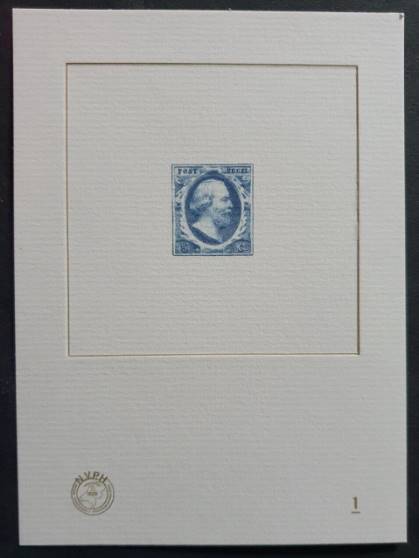
Netherlands Blueprint 1P
2004
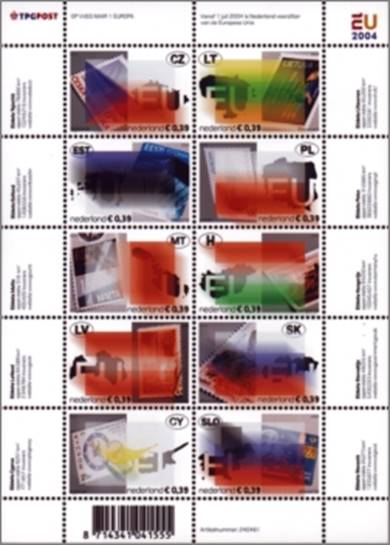
Scott: #1171a-jP
Issued: 10.5.2004
On The Way to 1 Europe
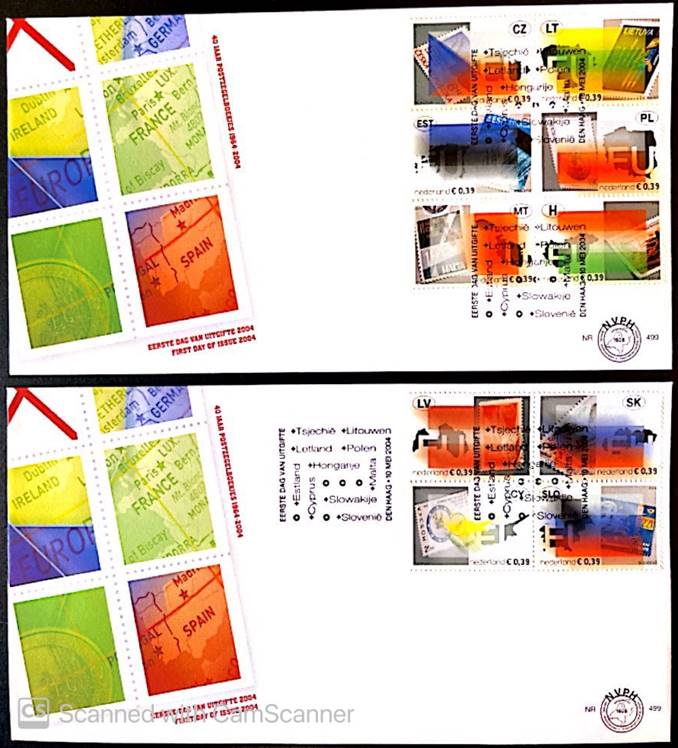
Inside #1171a-j:
|
|
|
|
|
a. Czech Rep. #2941P (1995) |
b. |
|
|
|
|
|
|
c. Estonia #415P (2001) |
d. |
|
|
|
|
|
|
e. Malta #395P (1968) |
f. |
|
|
|
|
|
|
g. |
h. |
|
|
|
|
|
|
i. |
j. |
Thanks to Lou Guadagno
![[My Stamps, type BYW]](Netherlands_image172.jpg)
Scott: #1301P
Issued: 02.01.2008
80 Years NVPH (Dutch Stamps Dealers
Ass.)
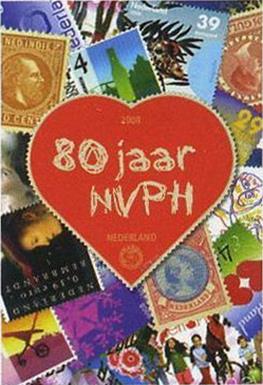
Inside #1301:
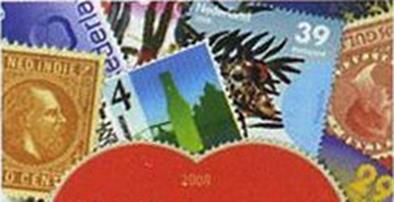
|
|
|
|
|
|
Netherlands #905P |
Netherlands #B749bP |
|
|
|
|
|
|
|
|
|
Netherlands #1265cP |
Netherlands #1256aP |
Netherlands #162P |

|
|
|
|
|
|
Netherlands #1258aP |
Netherlands #1257P |
|
|
|
|
|
Netherlands #B750fP |
|
Netherlands #1255P |
|
|
|
|
|
Netherlands #1253cP |
|
Netherlands #1181P |

|
|
|
|
|
|
Netherlands #1258hP |
|
|
|
|
|
|
Netherlands #1265dP |
|
Netherlands #B749cP |
Thanks to Lou Guadagno
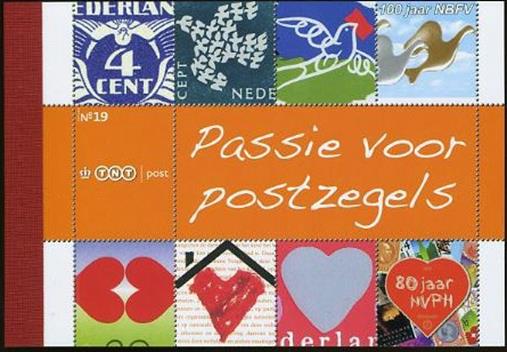
Passion for stamps prestige booklet
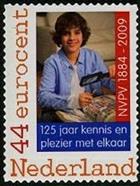
Scott: #1328P
Issued: 10.3.2009
125th Anniversary NVPV
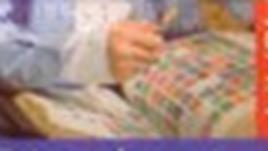
Inside #1328: Stamps Collecting
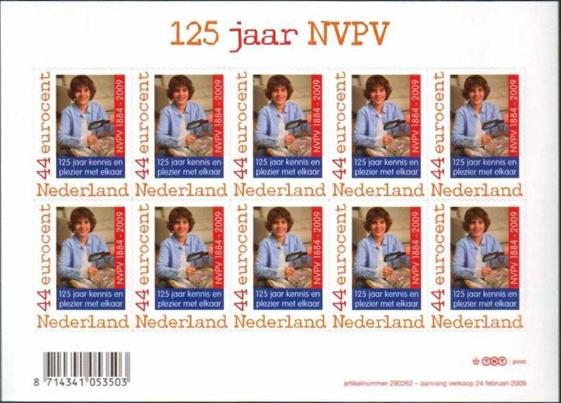
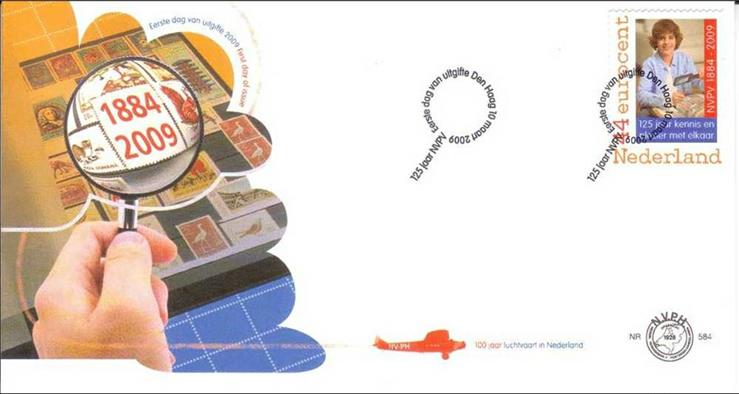
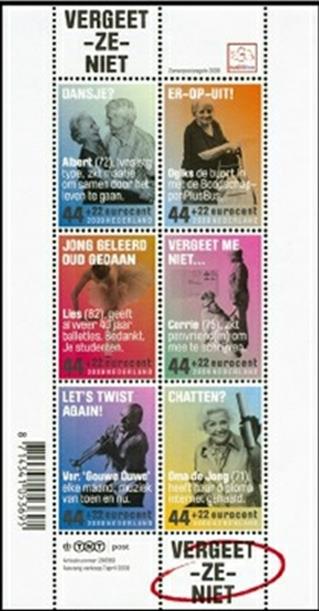
Scott: #B758O
Issued: 7.4.2009
Surtax for National Fund for Elderly
Assistance
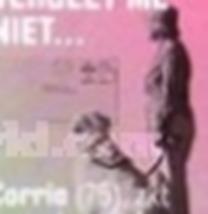
Inside #B758d: Stamps on envelope – TBI
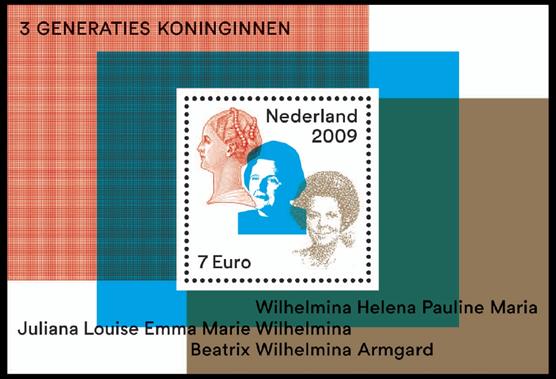
Scott: #1336aO
Issued: 28.4.2009
3 Generations of
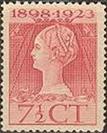 Inside #1336a:
Inside #1336a:
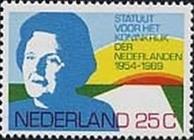 Inside #1336a:
Inside #1336a:
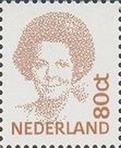 Inside #1336a: Netherlands #774P
(Queen Beatrix)
Inside #1336a: Netherlands #774P
(Queen Beatrix)
Thanks to Lou Guadagno
STAMP
For the
Wilhelmina ascended the
throne in 1890 at the age of ten, on the death of her father, King William III.
Her mother, Emma, acted as regent until Wilhelmina was eighteen. In 1901, Queen Wilhelmina married Heinrich, Duke of Mecklenburg-Schwerin
(“Prince Hendrik”). Their
daughter Juliana was born on 30 April
The royal “style” has
changed over the years. Queen Juliana’s personal approach revealed an obvious
desire to bring the monarch closer to her subjects, as was demonstrated at the
annual parade in the gardens of
DESIGN
Julia Born, the designer of the “3 Generations of Queens” sheetlet,
found herself fascinated by the existing range of stamps showing Queens of the
“It’s really interesting to see how the
designs are rooted in the particular period from which they date,” says Julia
Born. “Wilhelmina is shown in profile, illuminated by a kind of heavenly light;
the representation therefore becomes aloof and almost religious. The technique
used, copperplate printing, is now old-fashioned and is hardly used anymore. On
her stamp, Juliana radiates serenity and harmony, and she is portrayed as
closer to the observer. The design is typical of the late 1960s and early 70s,
with a lot of contrast in the portrait. The dots in the famous “dots portrait”
of Queen Beatrix are a reference not only to the conceptual approach but also
to the digital age: a computer was in fact used to position them.
After selecting the
three portraits, Julia Born removed the background so as to bring them back to
their iconic essence. The composition of the new sheetlet
has been kept simple, with a diagonal running from the top left to the bottom
right, and with the direction of the subject’s view shifting from fully to the
left (Wilhelmina) via half-left past the observer (Juliana) to frontal
(Beatrix). Julia Born explains this as follows: “Looking to the left is often
associated with looking into the past, while a frontal presentation suggests
the present. We therefore see a sweep from full left to frontal, which can be
taken as a shift from the past to the present. Queen Juliana is shown in the
middle of the design because of her central role in this issue. Imposed on the
white background of the stamp sheetlet are three
diagonally positioned areas of equal size, in the colours
dark red, blue, and metallic bronze-green ochre.”
The portrait of Queen
Wilhelmina has been printed using copperplate printing and that of Queens
Juliana and Beatrix by means of offset; because of the restricted run, the
original photogravure was not used. One special point to note is that the
various techniques and portraits overlap one another. This symbolises
the periods the three royal personages experienced together. The baptismal
names of the three queens are shown in a special manner, centring
on the name “Wilhelmina”, which all three of them shared. This is an elegant
and effective way of showing the historical and family links between them.
https://collectclub.tntpost.nl/pages/content/s2/pzn+3+kon+engels.aspx
Lou wrote: In addition to the regular s/s, Netherlands issued a prestige booklet containing a write up and a different layout of the s/s - both booklet and s/s are listed as Sc #1336a. I has this booklet in my database and collection since issued, but no scans of content until now. I didn't want to fold booklet open to take pictures, but just saw that one seller did that, so I copied scan. Then I found scan of booklet pane - after 14 years!
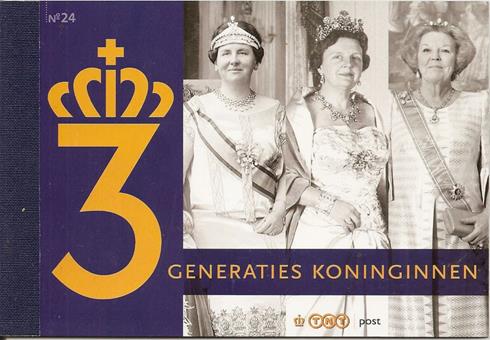
Netherlands #1336a prestige booklet
cover
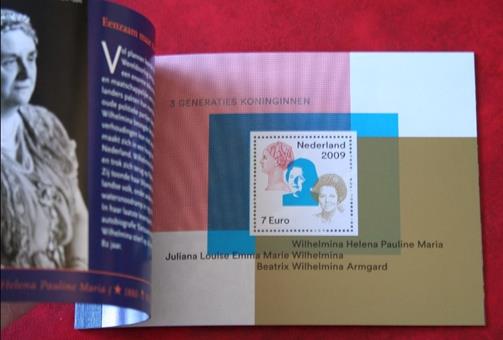
Netherlands booklet contents
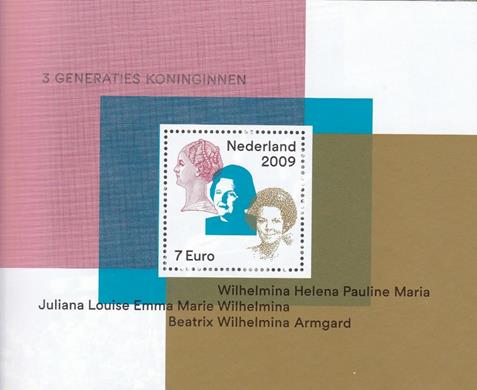
Netherlands #1336a booklet pane
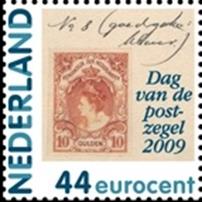
Scott: #1344P
Issued: 1.10.2009
Stamp Day
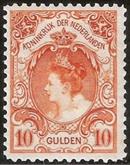 Inside #1344:
Inside #1344:
Thanks to Prof. Plinio
Richelmi
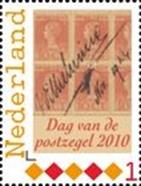
Scott: #1374P
Issued: 14.09.2010
Stamp Day
 Inside #1374:
Inside #1374:
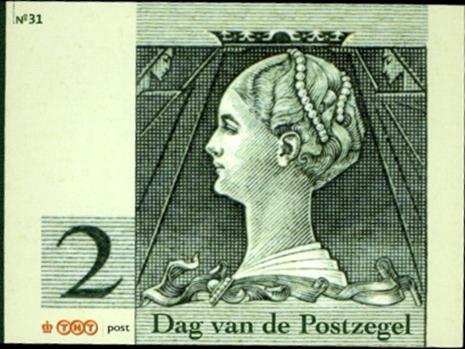
Thanks to Lou Guadagno
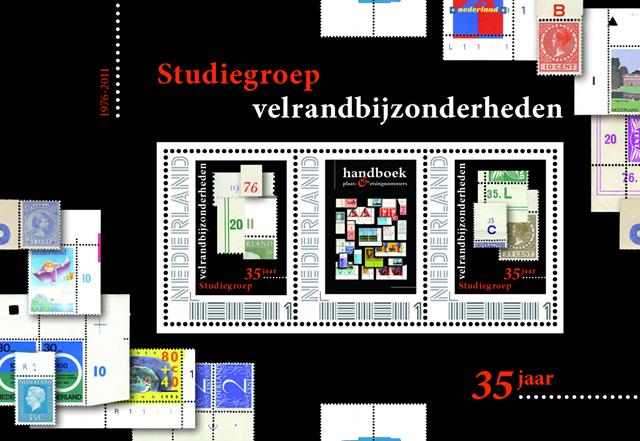
Scott: UnlistedP
Issued: 09.2011
35th Anniversary, Plate Number (?)
Study Group (Personal stamps)
http://www.etsingnummers.nl/html/actueel.html

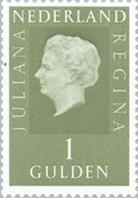 Inside #???? (In left stamp):
Inside #???? (In left stamp):
Inside #???? (In center stamp on
Handbook cover):

|
|
|
|
|
||||
|
Netherlands #B148P |
|
|
|
||||
|
|
|
|
|||||
|
Netherlands #422P |
Netherlands #B618P |
|
|||||
|
|
|
|
|
||||
|
Netherlands #139O |
|
|
|
||||
|
|
|
|
|
||||
|
Netherlands #146P |
|
|
Netherlands #B664P |
||||
|
|
|
||||||
|
|
|
||||||
|
|
|
|
|||||
|
Netherlands #B672P |
|
Netherlands #B661P |
|||||

Inside #???? (In right stamp)
|
|
|
|
|
|
|
|
Inside #???? (In margin at left):
|
|
|
|
|
|
|
Netherlands #B566P |
||
|
|
|
|
|
|
|
|
Netherlands #B693P |
|
Inside #???? (In margin at right):
|
|
|
|
|
Netherlands #1042P |
|
|
|
|
|
|
|
Netherlands # B561P |
||
|
|
||
|
|
||
Thanks to Lou Guadagno

Scott: #1427O
Issued: 19.10.2012
Stamp Day
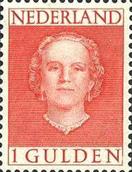 Inside #1427:
partial
Inside #1427:
partial
(Pic of
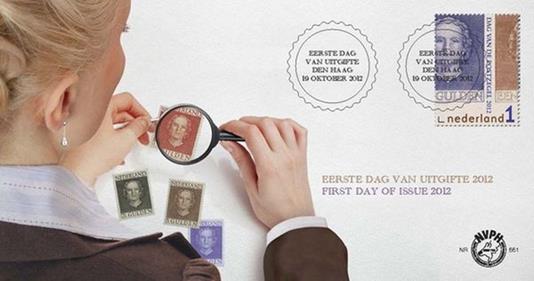
Lou wrote: This is a
very unusual sos from the
The issued stamps have
solid lettering and numerals, but in the reproduced proofs the lettering is
outlines and the one proof that shows a value reads "EEN" instead of
the numeral "1".
A folder also released
by the Post illustrates essays with various letterings. The cachet on the FCD
shows the stamps as issued.
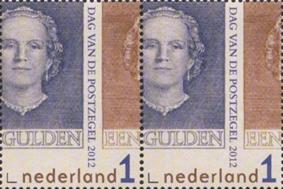
Se-tenant pair
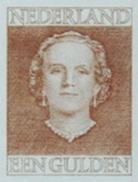
Netherland original essay - 1949
(thanks to
Lloyd Gilbert)

Full sheetlet
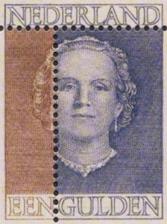
A composite of the essay from the sheetlet
2 years later Lou
wrote: None of the new issue dealers
offered this stamp in a se-tenant pair-- and they should have.
I was annoyed that the
stamp showed portions of two essays of unissued stamps, but when I saw the full
sheetlet, I realized that the designer had actually
created a very unique layout that required two stamps to be complete; the right
side portion of one stamp matches up with the left side portion of the attached
(se-tenant) stamp to create a full image of the queen's face-- in two colors. I
had identified these as essays with the value spelled out in outlined
lettering, and the designer also included the full design of the essay in the sheetlet by including the outlined lettering of the country
name in the margin.
Thanks to Lou Guadagno
![[Day of the Postage Stamp, type GVA]](Netherlands_image345.jpg)
Scott: #1452O
Issued: 18.10.2013
Stamp day
 Inside #1452: Netherlands #C9O
Inside #1452: Netherlands #C9O
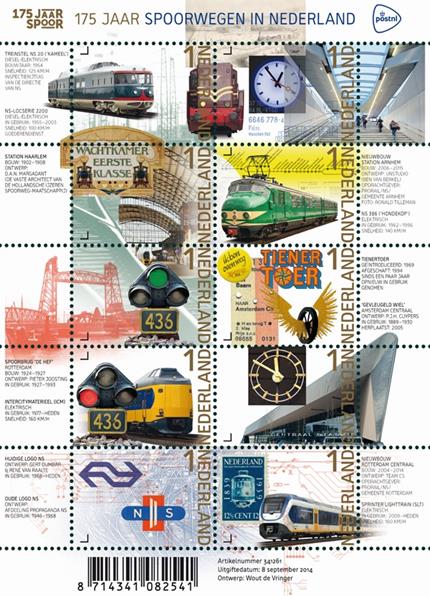
Scott: #1478O
Issued: 08.09.2014
175th Anniversary Netherlands Railroads
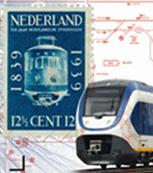
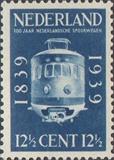 Inside #1478j: Netherlands #215P
Inside #1478j: Netherlands #215P
Thanks to Lou Guadagno

Scott: #1480O
Issued: 17.10.2014
Stamp Day
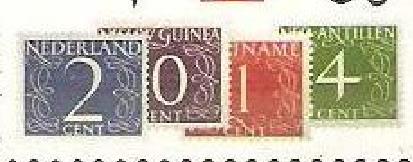
 Inside #1480: Netherlands #283P
Inside #1480: Netherlands #283P
 Inside #1480: Netherlands New Guinea #8P
Inside #1480: Netherlands New Guinea #8P
 Inside #1480: Surinam #211O
Inside #1480: Surinam #211O
 Inside #1480: Netherlands Antilles #212AP
Inside #1480: Netherlands Antilles #212AP
Thanks to Lou Guadagno and
Prof. Plinio Richelmi
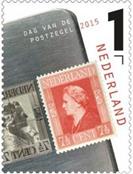
Scott: #1503O
Issued: 16.10.2015
Stamp Day
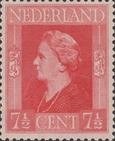 Inside #1503: Netherlands #266O
Inside #1503: Netherlands #266O
(also on
defaced die)
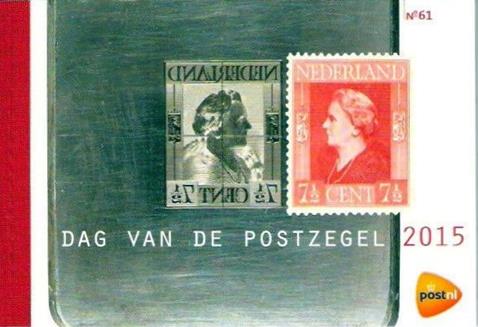
Thanks to Lou Guadagno
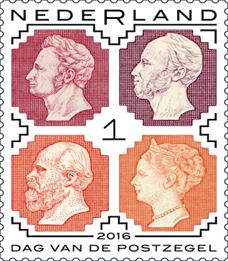
Scott: #????P
Issued: 14.10.2016
Stamp Day 2016
![[The 100th Anniversary of Independence, type N]](Netherlands_image374.jpg)
![[The 100th Anniversary of Independence, type O]](Netherlands_image375.jpg)
![[The 100th Anniversary of Independence, type P]](Netherlands_image376.jpg)
![[The 100th Anniversary of Independence, type Q]](Netherlands_image377.jpg)
Inside #????:
Netherlands #90-3O

In 1913 a set of 12
stamps was issued in occasion of the 100th anniversary of independence of the
Kingdom of the Netherlands.
The 1913 stamps depict one of the Dutch monarchs on each of the stamp; king William I, William II, William III en queen Wilhelmina.
The 2016 stamp depicts these portraits from the 1913 issue.
The stamps have value indicator '1' which is inland mail up to 20gr = €0.73 (sheet €7.30) and are only sold as sheet of 10.
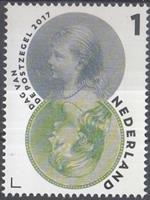
Scott: #????O
Issued: 08.11.2017
National Stamp Day 2017
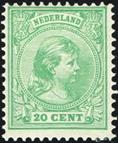 Inside #????:
Netherlands Type A8P
Inside #????:
Netherlands Type A8P
https://www.stamp-collecting-world.com/netherlandsstamps_1891d.htm
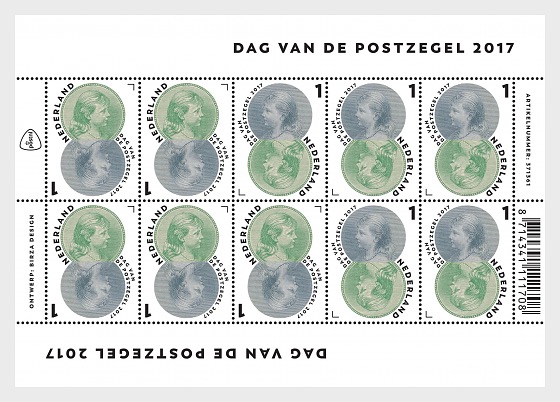
The National Stamp Day
2017 stamp sheetlet consists of ten identical special
stamps marked with a denomination of 1, for items weighing up to 20g and
destined for mail in the Netherlands. Each stamp features two circles together,
one above the other. Both circles contain the portrait of Queen Wilhelmina with
her hair loose, as it was depicted on the stamps that first appeared in 1891.
One circle is in the green colour of the stamp
itself, with a postage value of 20 cents. The other circle is in the blue-grey colour of the wood engraving that was used to assess the
design for these stamps. The two portraits were made on the basis of the same
photograph, but there are small differences. On the stamp, Queen Wilhelmina
looks towards the right, but on the wood engraving she looks towards the left.
There is a narrow decorative border around the green portrait, similar to the
one printed on the stamps themselves. This narrow border is missing in the
blue-grey portrait. The typography on the stamps follows the form of the
circles. Alongside the green portrait is the destination, the Netherlands, and
next to the blue-grey portrait the name of the issue. This name is also printed
on the sheetlet edges in such a way that both sheet
edges can be seen as the top edge. The same effect is achieved by mirroring the
stamps two by two and three by three on the stamp sheetlet.
The font used for the typography is Trenda Heavy (Latinotype, 2013), designed by Daniel Hernández and
Paula Nazal.
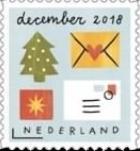
Scott: #????P
Issued: 05.11.2018
Christmas
Inside #????:
Stamp on Envelope
![[Christmas, type ]](Netherlands_image386.jpg)
Scott: #????-?
![[Stamp Day, type ]](Netherlands_image387.jpg)
Scott: #????-?P
Issued: 01.11.2019
National Stamp Day 2019
![[Airmail, type U]](Netherlands_image388.jpg) Inside #????:
Netherlands #C1O
Inside #????:
Netherlands #C1O
![[Airmail, type U1]](Netherlands_image389.jpg) Inside #????:
Netherlands #C2O
Inside #????:
Netherlands #C2O
![[Bicycle Stamps, type ]](Netherlands_image390.jpg)
Scott: #????O
Issued: 17.08.2020
Bicycle Stamps
Inside #????: Pseudo
Stamps
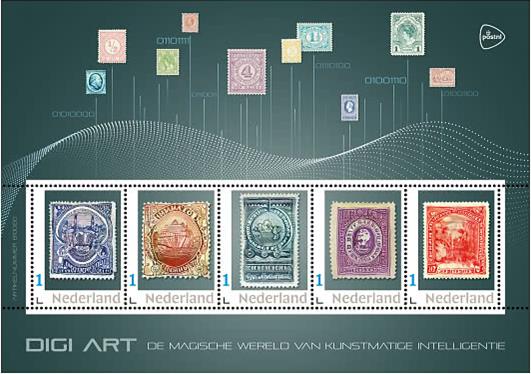
Scott: #????O
Issued: 28.10.2021
Digi Art
Inside #????-?:
Pseudo Stamps
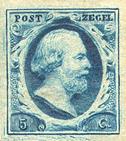 Inside #???? (In margin): Netherlands #1P
Inside #???? (In margin): Netherlands #1P
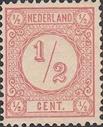 Inside #???? (In margin): Netherlands #34O
Inside #???? (In margin): Netherlands #34O
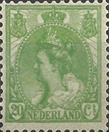 Inside #???? (In margin): Netherlands #74O
Inside #???? (In margin): Netherlands #74O
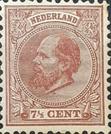 Inside #???? (In margin): Netherlands #24O
Inside #???? (In margin): Netherlands #24O
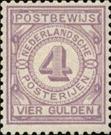 Inside #???? (In margin): Netherlands Postal
Money order stamp Mi PW 5O (1884)
Inside #???? (In margin): Netherlands Postal
Money order stamp Mi PW 5O (1884)
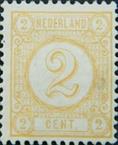 Inside #???? (In margin): Netherlands #36aO
Inside #???? (In margin): Netherlands #36aO
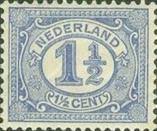 Inside #???? (In margin): Netherlands #57O
Inside #???? (In margin): Netherlands #57O
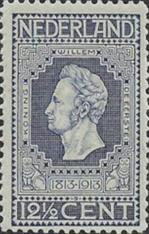 Inside #???? (In margin): Netherlands #94O
Inside #???? (In margin): Netherlands #94O
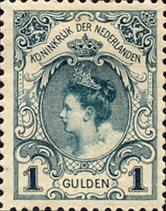 Inside #???? (In margin): Netherlands #83P
Inside #???? (In margin): Netherlands #83P
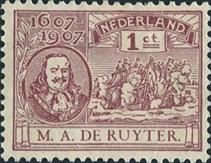 Inside #???? (In margin): Netherlands #88O
Inside #???? (In margin): Netherlands #88O
King
Willem III 5 cents (1864), Numeral stamp ½ cent (1876), Queen Wilhelmina 20
cents (1899), King Willem III 7½ cents (1872), Postal order stamp 4 guilders
(1884), Numeral stamp 2 cents (1876), Numeral stamp 1½ cents (1899), Jubilee
stamp 100 years of independence 12½ cents (1913), Coronation stamp Queen
Wilhelmina 1 guilder (1898) and Michiel de Ruyter 1 cent (1907).
With
the Digi Art issue, PostNL is the first postal
company in the world to issue a stamp sheet with a design created by a computer
algorithm. The Digi Art stamp sheet features five different personal stamps
that were designed by an algorithm based on a collection of around 1500 stamps
from the period from 1852 to 1920. The personal stamps are marked ‘Nederland
1’, the denomination for post weighing up to 20g sent to an address within the
Netherlands
Artificial
intelligence (AI), refers to computer systems that mimic human intelligence.
These AI systems are capable of extrapolating large amounts of data, making new
decisions and choices, and coming up with new interpretations. To achieve this,
the computer systems use algorithms – mathematical formulas that are able to
make independent decisions based on data or indicators – and learn from them.
The developments in artificial intelligence are coming thick and fast. It is
used in numerous applications, from face recognition on smartphones and
self-driving cars to smart thermostats and deep fakes – digitally manipulated
images, sounds and texts. Within AI there is a separate discipline called
generative art, which is when a computer algorithm creates an original work of
art or design. And this is exactly what was used for PostNL’s
Digi Art stamp issue.
The
stamp Digi Art stamp sheet features five postage stamps in five different
designs. The five stamps feature five unique
computer-generated designs against a dark background.
At first glance, the five stamps look as if they have been issued before, but
appearances can be deceiving. They may look like classic stamps, but they are not.
All the elements are familiar, such as a supporting picture in the centre with a frame around it, a strip at the bottom for
text, decorations in the corners and a frame with perforations... and yet, they
are different from the familiar stamps from the 1852-1920 period.

The
sheet edge, which was designed by graphic designer Sandra Smulders, features
ten Old Dutch stamps. From left to right, these are: King Willem III 5 cents (1864),
Numeral stamp ½ cent (1876), Queen Wilhelmina 20 cents (1899), King Willem III
7½ cents (1872), Postal order stamp 4 guilders (1884), Numeral stamp 2 cents
(1876), Numeral stamp 1½ cents (1899), Jubilee stamp 100 years of independence
12½ cents (1913), Coronation stamp Queen Wilhelmina 1 guilder (1898) and Michiel de Ruyter 1 cent (1907).
The
10 stamps are connected to the personal stamps with vertical lines via a
horizontal elongated wave. The lines indicate the direction that the old stamps
have travelled through the algorithm – represented by the wave – to form the
new stamps. The background colour is derived from the
personal stamp in the centre. The dark corners
suggest depth. The gradient returns in the background of the stamps. In between
the stamps, there are six individual letters in binary code (ones and zeros).
The ones and zeros have different hues to symbolise
the process of their creation.
Thanks to Martin
Hirschbühl, Michael Merritt and Lou Guadagno

Scott: #????O
Issued: 16.05.2022
Post Trains
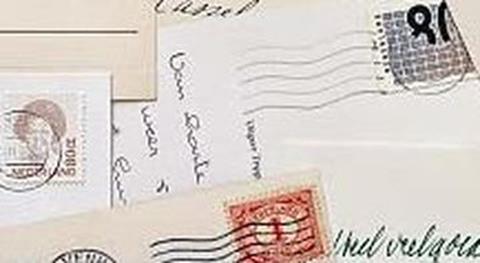
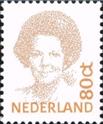 Inside #???? (In
margin): Netherlands #774P
Inside #???? (In
margin): Netherlands #774P
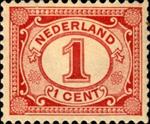 Inside #???? (In
margin): Netherlands #56P
Inside #???? (In
margin): Netherlands #56P
 Inside #???? (In
margin): Netherlands #952P
Inside #???? (In
margin): Netherlands #952P
Thanks to Komlóssy
Zoltán and Lou Guadagno
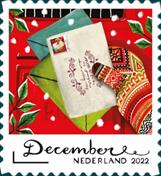
Scott: #1654dO
Issued: 14.11.2022
Christmas
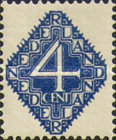 Inside #1654d (In margin): Netherlands #1654dO
Inside #1654d (In margin): Netherlands #1654dO
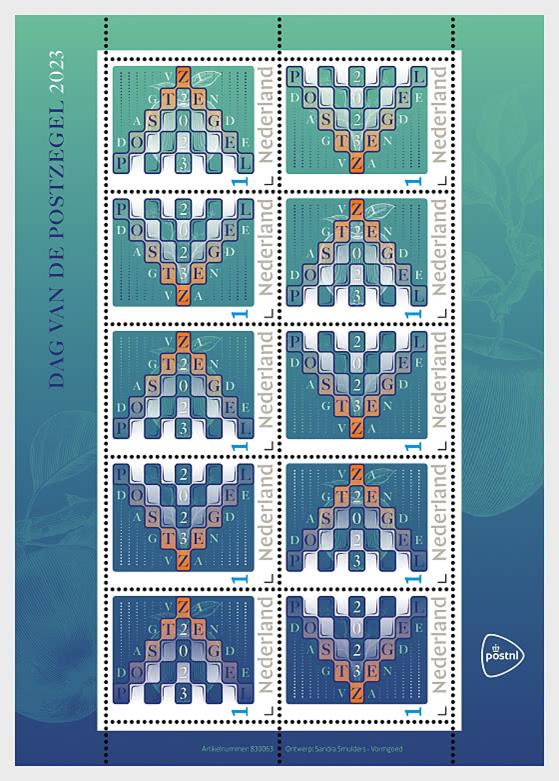
Scott: #1654O
Lou
Wrote: On November 14, 2022, the Netherlands issued a 20 value self adhesive sheetlet
of December Stamps, specially for Christmas cards and
new year's greetings. As a gift to the public, from that date until January 6th, the sheetlet was sold at a
€.05 reduced price (€ .91), but stamps from the sheetlet
were not sold individually. In the sheetlet
the two groups of ten stamps had different positions.
The
SoS is a very colorful stamp
showing a knit mittened hand mailing a letter with
the same stamp, so it is an ad infinitum self design.
Checking
in Scott Stamp Monthly, I found that the sheetlet
was not listed until the December 2024 issue - two years + later, and they
must have acquired the bottom half of the sheetlet
for their records, since the SoS stamp is listed as
the fourth stamp, and not the first, as in the upper half.
Thanks to Lou Guadagno
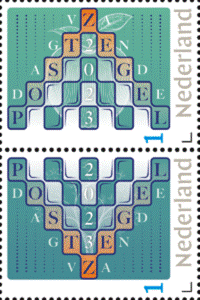
Scott: #????O
Issued: 16.10.2023
Stamp Day
![[New Daily Stamps, type Y]](Netherlands_image432.jpg) Inside #????:
Netherlands #116P
Inside #????:
Netherlands #116P
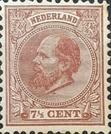
Scott: #????O
About
Stamp Day
Stamp
Day is an annual international event. In most countries, the day is celebrated on the first Sunday after 9 October: the founding
date of the Universal Postal Union (UPU). The UPU, also known as the Universal
Postal Union, sets the rules for international postal traffic between member
states. PostNL is marking Stamp Day by publishing the
Stamp Day 2023 sheet on Sunday 16 October. The denomination on these stamps is
‘1’, the denomination for items weighing up to 20g destined for the
Netherlands. The sheet was designed by graphic designer
Sandra Smulders from Gouda using the 1923 Artist Series stamps as inspiration.
A sheet of ten Stamp Day 2023 stamps costs €10.10.
The
1923 Artist Series stamps were the first modern stamps after architect
Karel de Bazel's 1913 Jubilee stamps. The 1923 Artist
Series comprises four stamps in three designs, created by architect Michel de
Klerk, typographer Sjoerd de Roos
and graphic designer Nicolaas van de Vecht. Their designs were selected
from the 90 entries to the Dutch Numerical Stamp Competition launched by the Staatsbedrijf der Posterijen en Telegrafie [‘Dutch State Post
and Telegraph Company’] in 1920. All Dutch artists were
allowed to enter the competition.
The
idea behind the competition was that a competition involving many artists would
produce a better result than if one designated artist designed the stamps. The
philatelic press was not always positive after the launch of the 1923 Artist
Series. Later times were judged more favourably. For example, art historian Paul Hefting wrote
in an article in De Gids in 1993 that the design of the 1923 Artist Series is defined by a mixture of
austere and ornate ornamental forms. The atmosphere expressed by these
stamps is said to be of a ‘modern religious propriety’
and of a ‘great seriousness that beauty then entailed’.
The
1923 Artist Series features four stamps worth 1, 2, 2½ and 4 cents. The blueish-purple
1-cent stamp and the orange 2-cent stamp (designed by Michel de Klerk) depict a
lion in a Dutch garden with an apple tree. The blueish-green 2½-cent stamp
(designed by Sjoerd de Roos)
portrays a post horn with a climbing lion in the curl of the horn. The blue
4-cent stamp (designed by Nicolaas van de Vecht) features a diamond made up of rectangular shapes
containing the text NEDERLAND letter by letter. The stamps in the 1923 Artist
Series were valid from 1923 to 1935.Each of the ten stamps featured on the
Stamp Day 2023 sheet contains a half diamond: a triangle composed of 25 stacked
rectangles with rounded corners. The image area of each half-diamond stamp
joins the image area of the adjacent stamp where possible, separated by the
fixed frame, to create the illusion of a complete diamond shape. The diamond
motif is taken from the 4-cent stamp in the 1923
Artist Series. The numbers and letters in the title Stamp Day 2023 are placed in and against the rectangles on the new stamps.
The space outside the triangle contains dots that change colour
coverage and size evenly. The background colour on
the stamps changes from green to blue, from top to bottom across the sheet. The
same happens on the sheet edge. Behind the diamond shape on the stamps is a line
drawing of an apple and an apple tree changing from white to green. The drawing
of the apple also returns in a different form on the left and right hand sides
of the sheet edge.
The
font used for the denomination 1 and Nederland was designed in 2018 by font
designer Martin Majoor from Arnhem. The rest of the
typography uses the Big Caslon CC Bol font. This serif font is a 1994 design by Matthew Carter from Cambridge
(Massachusetts, USA) and was inspired by the 18th century Baroque font Caslon.
Stamp Day 2023 was designed by graphic designer Sandra
Smulders from Gouda. Smulders has produced
designs for Stamp Day since 2020. In preparation for this new assignment, she
visited the National Archives in The Hague, which manages the largest, most
important collection of postage values in the Netherlands. ‘At the time, it hadn’t been decided which historical stamps would inspire
the new design,’ Smulders says. ‘But I already knew that the 1923 Artist Series
was a candidate. Seeing the original drawing for the 4-cent stamp from this
series in the archives absolutely delighted me. It was a strong graphic design
– especially for its era.’
100
years ago
It
was partly thanks to Smulders' enthusiasm that PostNL
selected the 1923 Artist Series as the inspiration for Stamp Day 2023.
Smulders: ‘The dating – it was 100 years ago, after all – was, of course,
already a pull. During my preparation, I also requested the original drawings
for the other stamps in the series. You can see much more detail on those
drawings than you can see on the printed stamps. That’s
because there were far fewer printing techniques back then. Nicholas van de Vecht’s design of the 4-cent stamp remained my favourite. I used that design to get started. I put the
other drawings aside for the time being, but I still used them later.’
The
half diamond
The
blue 4-cent stamp in the 1923 Artist Series features a diamond shape made up of
interconnected rectangular shapes. The squares contain the letters of the word
NEDERLAND and the 4-cent value indication is centred in the diamond. ‘The diamond shape was my
starting point for the new design,’ Smulders said. ‘I divided the diamond into
two to make it suitable for the fixed frame of the personal stamps. Each stamp
now shows a half diamond, with the points going up and down alternately. This
gives the sheet a playful layout. On eight of the ten stamps, the half diamonds
together form a whole diamond. When I was sketching, I noticed that the words ‘postzegel’ (stamp) and ‘Nederland’ (Netherlands) contain
the same amount of letters. This meant I could imitate the 1923 stamp by
placing the letters of the new title in the diamond in the same way.’
Bulging
shapes
Smulders
used more elements from the original 4-cent stamp. The wavy lines within the
shapes return, as do the dots, which she placed to the left and right of the
half diamond. Smulders: ‘I was able to position the rest of the Stamp Day 2023
title on the outside of the shapes. I positioned 2023 horizontally at first,
and later vertically within the diamond. In order to give the design more depth
and make the letters more legible, I applied a colour
gradient with a different coverage. This made the shape appear convex. The
bulging effect is enhanced as the dots change colour and size. And adding white to some of the planes
made the diamond more dynamic.’
Blue,
green and orange
In
initial designs, Smulders opted the same colour blue
as that featured on the 4-cent stamp. Later, she added other colours from the 1923 Artist Series: green as a second colour, borrowed from the 2½-cent stamp and orange as an
accent colour from the 2-cent stamp. ‘Graphically, I
created two different designs, with a half diamond pointing up or down,’
Smulders says. ‘But by applying slightly different gradients everywhere, I
ensured that no two stamps are the same.’
Apple
and apple tree
Smulders
also used elements from the other stamps in the 1923 Artist Series. ‘All of my
previous Stamp Day designs were strongly layered, with a high level of
sophistication and a logical structure. I wanted to do that again this time, so
I pulled up the other drawings for the 1923 Artist Series. I went for the apple
and apple tree from the 1-cent and 2-cent stamps, as the spherical apple shape
fits nicely behind the half diamond. The same goes for the apple tree –
especially behind the half diamond with the tip pointing downwards. The shapes’
transparency means you can see the other shapes shining through. The image of
the apple tree was substantially reworked to reflect
the curly lines from the 2½-cent stamp. This means I could pay tribute to all
the stamp designs in the 1923 Artist Series.’
Stochastic
printing
The Stamp Day 2023 design is highly layered and contains
all sorts of details that are references to the historical stamps.
‘There’s a lot going on,’ Smulders says, ‘but it's all right. That matches my
logical design approach, as there’s lots of
sophistication. Joh. Enschedé printed the
stamps using stochastic grids. In this technique, the dots land on the paper in
a random pattern rather than in fixed, angular patterns. Even the smallest
details featured in the design were accurately transferred to the stamps.’
About
the designer
Sandra
Smulders (The Hague, 1974) studied advertising and presentation design at Nimeto Utrecht from 1991 to 1995, specialising
in graphic design. After graduation, she worked as a graphic designer and art
director with Admix B2B agency, FPW communications agency, Manten
Grafisch Ontwerpbureau, and
VDM Reklame, all four of them based in Rotterdam. She
started the Vormgoed agency in Gouda in 2007 as a
graphic designer and art director. Smulders specialises
in designing logos and corporate styles and further developing their associated
means of communication. She mainly works for business clients. Her recent
clients include engineering firm ABT, travel company
All for Nature, Groundwater Technology, Overeijnder
Van den Dool communications and Uitgeverij
DAVO. For PostNL Smulders also designed the 2022
World Animal Day and Stamp Day 2020, 2021 and 2022 stamp sheets, the Back to
the 20th Century and Trains & Journeys (2019) stamp series, the 2018
Children’s Welfare Stamps, the stamp series celebrating 50 years of the Daily
Fable (2018) and the 25 years of Fokke & Sukke (2018) stamp series.
Thanks to Komlóssy
Zoltán
Best website
related:
A journey through the
http://members.lycos.nl/nedinpost/index.html
AMERICAN SOCIETY FOR
Old
![]()
Wish
List
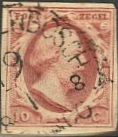
Netherlands #2 + for Belgium

Netherlands #3
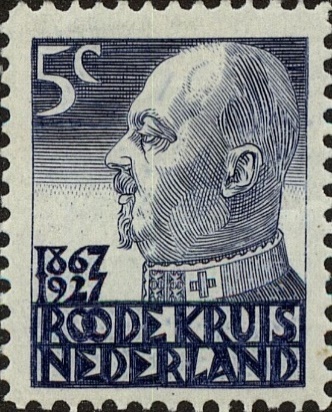
Netherlands #9 For
Bulgaria, Czechoslovakia
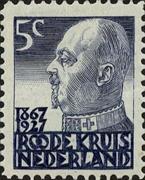
Netherlands #24
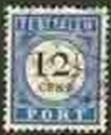
Netherlands Postal Money order stamp Mi PW 5O (1884)

Netherlands #34
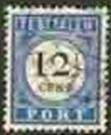
Netherlands #36a
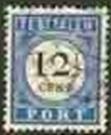
Netherlands #B18 for Gambia
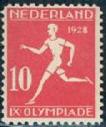
Netherlands #B25 for Kyrgyzstan

Netherlands #B27 for Niger,
Djibouti
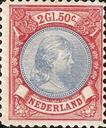
Netherlands #J23
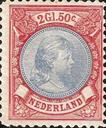
Netherlands #B30 for Haiti

Netherlands #43 for Surinam
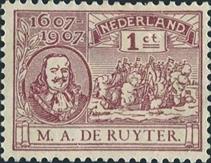
Netherlands #47
for St. Maarten
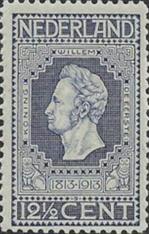
Netherlands #53
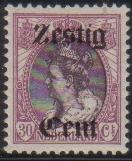
Netherlands #57
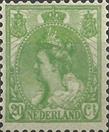
Netherlands #74
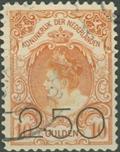
Netherlands #86

Netherlands #88
![[The 100th Anniversary of Independence, type N]](Netherlands_image374.jpg)
![[The 100th Anniversary of Independence, type O]](Netherlands_image375.jpg)
![[The 100th Anniversary of Independence, type P]](Netherlands_image376.jpg)
![[The 100th Anniversary of Independence, type Q]](Netherlands_image377.jpg)
Netherlands #90-3
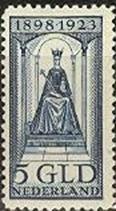
Netherlands #94
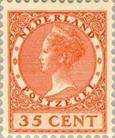
Netherlands #103 for Surinam
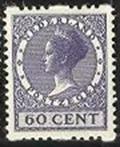
Netherlands #104 for Surinam
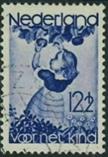
Netherlands #134 for Netherlands Antilles
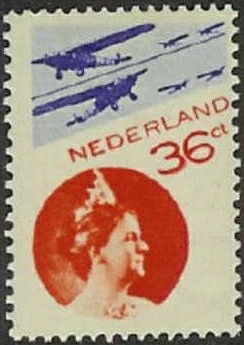
Netherlands #139
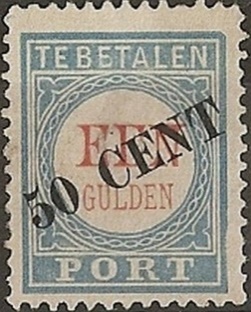
Netherlands #160 for Surinam
![[Airmail, type U]](Netherlands_image388.jpg)
Netherlands #C1
![[Airmail, type U1]](Netherlands_image389.jpg)
Netherlands #C2
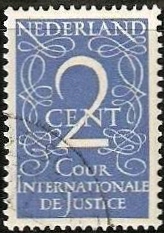
Netherlands #B85 for Surinam

Netherlands #C9 + for Surinam
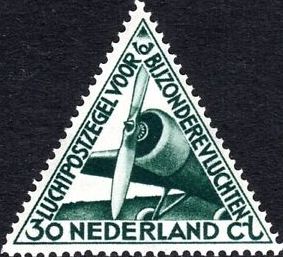
Netherlands #J27 for Surinam
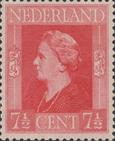
Netherlands #O25 for Surinam

Netherlands #O32 for Netherlands
Antilles
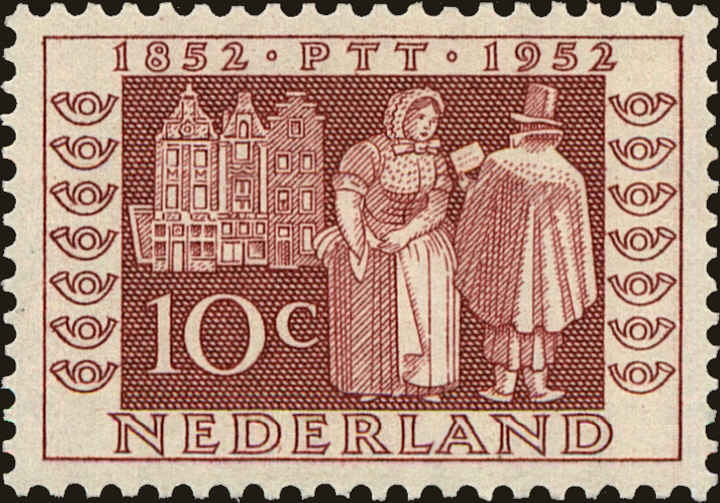
Netherlands #C20 for Surinam

Netherlands #266
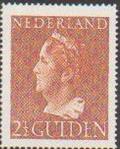
Netherlands #279 for Gambia
![[Princesses - Child Care and Fight Against Tuberculosis, type GS1]](Netherlands_image485.jpg)
Netherlands #B166 for Gambia (OTW – BOB 9.23)
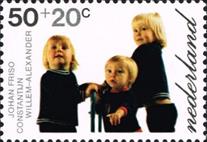
Netherlands #338 for Surinam (OTW – BOB 9.23)
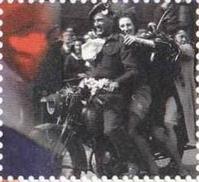
Netherlands #B437
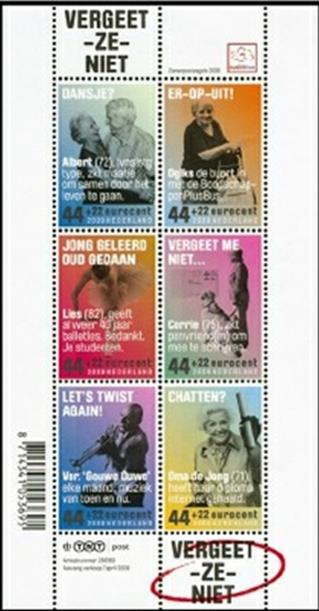
Netherlands #780
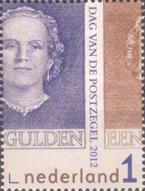
Netherlands #B492 for Gambia
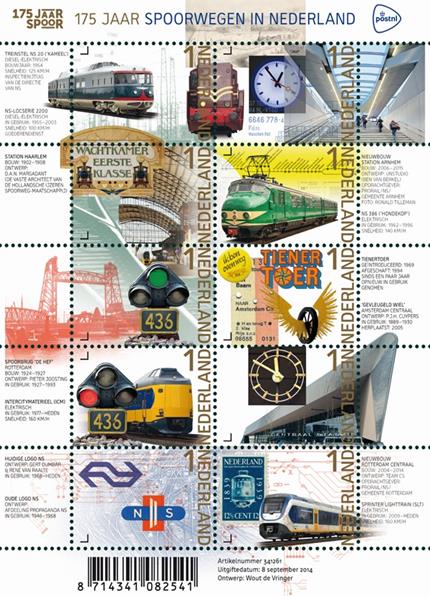
Netherlands #1040h
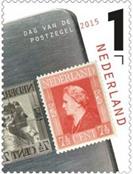
Netherlands #1290i

Netherlands #B758

Netherlands #1336a

Netherlands #1427
![[Day of the Postage Stamp, type GVA]](Netherlands_image344.jpg)
Netherlands #???? (2013)
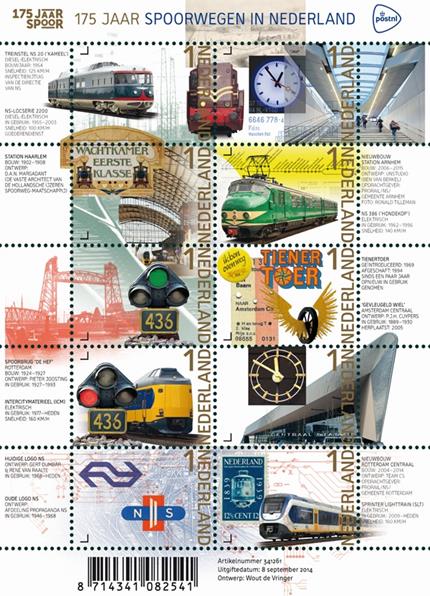
Netherlands #???? (2014)

Scott: #???? (2014)
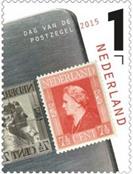
Scott: #???? (2015)

Scott: #???? (2017)
![[Bicycle Stamps, type ]](Netherlands_image390.jpg)
Scott: #???? (2020)

Scott: #???? (2021)

Scott: #????
(2022)

Scott: #1654d
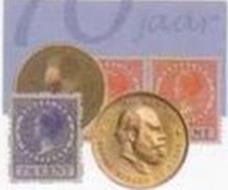
Scott: #????
(2023)
Netherlands Indies – See Indonesia
Netherlands Personal stamps
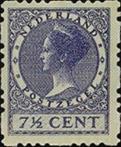
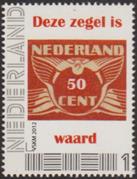
Scott: #????O
Issued: ??.??.2012
??????? (Personal stamps)
 Inside #????: Netherlands Queen Julianna Type A77 (Pic of
Netherlands #319)
Inside #????: Netherlands Queen Julianna Type A77 (Pic of
Netherlands #319)
 Inside #????: Netherlands Type A24 (Pic of Netherlands
#142)
Inside #????: Netherlands Type A24 (Pic of Netherlands
#142)
Thanks to Lloyd Gilbert

Scott: #????O
Issued: ??.??.2012
70th Anniversary of The Netherlands
Stamp and Coin Auctions (Personal stamps)

 Inside #???? (In left stamp): Netherlands
#174c
Inside #???? (In left stamp): Netherlands
#174c
Rare
3 holes vertical syncopated perfs variety
 Inside #???? (In left stamp): Netherlands
#176b
Inside #???? (In left stamp): Netherlands
#176b
Rare
value omitted variety - partial
 Inside #???? (In left stamp): Netherlands #176
Inside #???? (In left stamp): Netherlands #176
Lou wrote: It is very
difficult with the poor scan to make out, but I am sure that there is no
imprinted "9 CENT" in the bottom value tablet of the left stamp, so I
gave it the #176b ID, but I don't understand why the designer would cover the
rarity with coins, and also not show it as a joined pair with a normal stamp as
it is usually offered. According to my brief research, # 174c, # 178b and the
Telegraph stamp below are the three rarest varieties in

 Inside #???? (In center stamp): Netherlands #1
Inside #???? (In center stamp): Netherlands #1
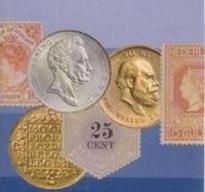 Inside #???? (In center stamp): Netherlands
#101
Inside #???? (In center stamp): Netherlands
#101

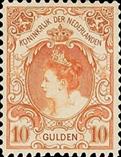 Inside #???? (In right stamp): Netherlands #86
Inside #???? (In right stamp): Netherlands #86
 Inside #???? (In right stamp): Michel #
Telegraph Stamp 7
Inside #???? (In right stamp): Michel #
Telegraph Stamp 7
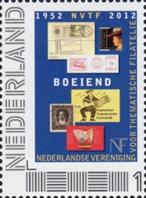
 Inside #???? (In left margin): Netherlands
#86
Inside #???? (In left margin): Netherlands
#86
 Inside #???? (In left margin): Netherlands
#101
Inside #???? (In left margin): Netherlands
#101
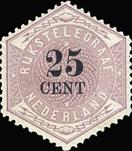 Inside #???? (In left margin): Netherlands
Michel Telegraph Stamp #7
Inside #???? (In left margin): Netherlands
Michel Telegraph Stamp #7
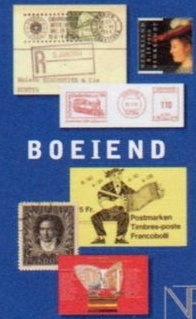
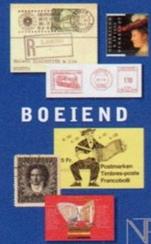 Inside #???? (In right margin): Netherlands #174c
Inside #???? (In right margin): Netherlands #174c
Thanks to Lou Guadagno
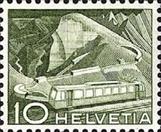
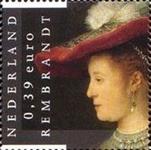
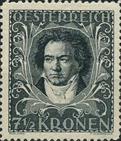
Scott: #????O
Issued: ??.??.2012
60th Anniversary of The Netherlands
Society for Thematic Philately (Personal stamps)
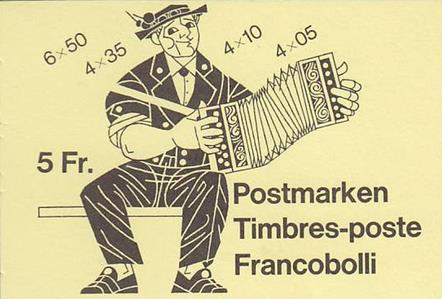
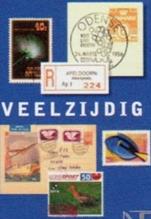 Inside #????a: Switzerland #330
Inside #????a: Switzerland #330
 Inside #????a: Netherlands
#1253cP
Inside #????a: Netherlands
#1253cP
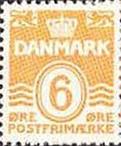 Inside #????a: Austria #B52
Inside #????a: Austria #B52

Inside #????a:
Switzerland Booklet cover 1984
 Inside #????a:
Booklet cover TBI and commemorative meter from Germany
Inside #????a:
Booklet cover TBI and commemorative meter from Germany
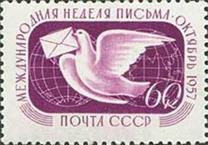
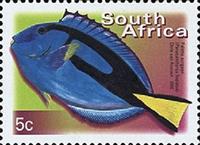 Inside
#????b: Netherlands Antilles #395
Inside
#????b: Netherlands Antilles #395
 Inside #????b:
Denmark #224cP
Inside #????b:
Denmark #224cP
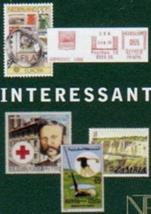
Inside #????b:
Russia-USSR Stationery Imp. Env. 1958
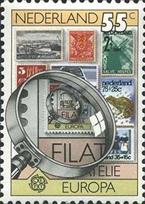 Inside #????b:
Russia-USSR #1986
Inside #????b:
Russia-USSR #1986
 Inside
#????b: South
Africa #1173P
Inside
#????b: South
Africa #1173P
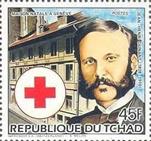
Inside #????b:
Netherlands Regio Post local bird stamp
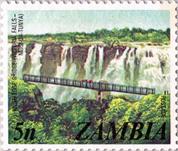
 Inside #????c:
Netherlands #587P
Inside #????c:
Netherlands #587P
 Inside #????c:
Morocco #310
Inside #????c:
Morocco #310
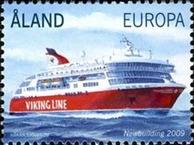 Inside #????c:
Chad #546
Inside #????c:
Chad #546
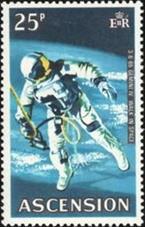 Inside #????c:
Zambia #139P
Inside #????c:
Zambia #139P

Scott: #????O
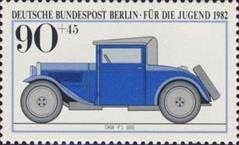
|
|
|
|
|
|
|
|
|
Aland #289 |
Ascension #149 |
Belgium #B933 |
Germany-Berlin #9NB190O |
|||
|
|
|
|
||||
|
Bulgaria #1495O |
Greenland #476 |
Burundi #601 |
Brazil #C101 |
Cuba #4318P |
||
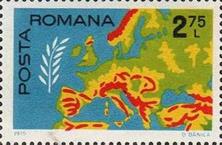
 Inside
#???? (In left margin): El Salvador 31547a
Inside
#???? (In left margin): El Salvador 31547a
 Inside #???? (In left margin): Germany
Democratic Rep. #1030
Inside #???? (In left margin): Germany
Democratic Rep. #1030
 Inside
#???? (In left margin): Indonesia #B93
Inside
#???? (In left margin): Indonesia #B93
 Inside #???? (In
left margin): Romania Mi Bl #124
Inside #???? (In
left margin): Romania Mi Bl #124

 Inside
#???? (In right margin): Guyana #2712
Inside
#???? (In right margin): Guyana #2712
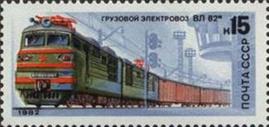 Inside #???? (In right margin): St. Lucia
#1968
Inside #???? (In right margin): St. Lucia
#1968
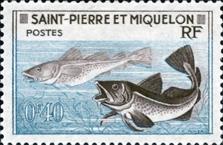
 Inside #???? (In bottom margin): Jamaica #304
Inside #???? (In bottom margin): Jamaica #304
 Inside #???? (In bottom margin): stamp with
figures (paper dolls?) TBI
Inside #???? (In bottom margin): stamp with
figures (paper dolls?) TBI
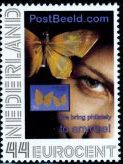 Inside #???? (In bottom margin): Austria #1210
Inside #???? (In bottom margin): Austria #1210
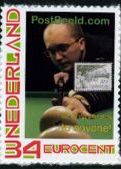 Inside #???? (In bottom margin): Russia-USSR
#5047
Inside #???? (In bottom margin): Russia-USSR
#5047
 Inside #???? (In bottom margin): St. Pierre
& Miquelon #351P
Inside #???? (In bottom margin): St. Pierre
& Miquelon #351P
Thanks to Lloyd Gilbert
Thanks to Lou Guadagno for Id's and scans
2009
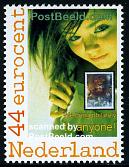
2010

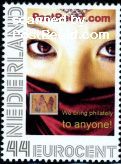
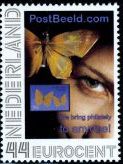
2011
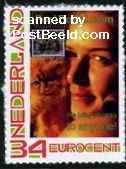
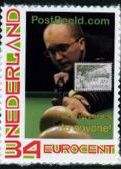
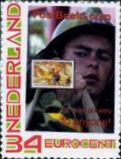
2012
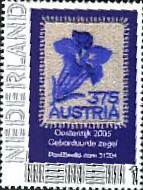
(thanks to
Komlóssy Zoltán)
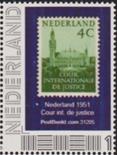
a
Netherlands private or personalized issue showing Netherlands Sc. #O29


